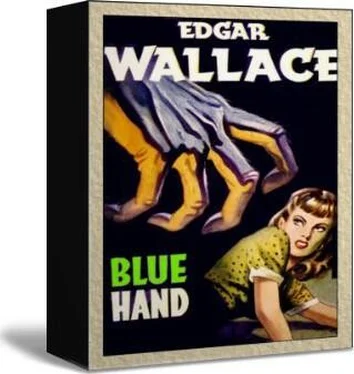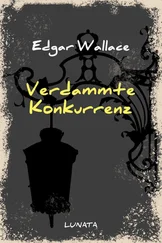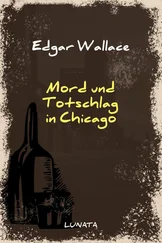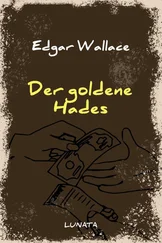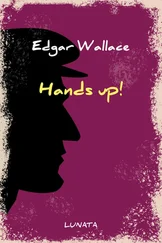Edgar Wallace - Blue Hand
Здесь есть возможность читать онлайн «Edgar Wallace - Blue Hand» весь текст электронной книги совершенно бесплатно (целиком полную версию без сокращений). В некоторых случаях можно слушать аудио, скачать через торрент в формате fb2 и присутствует краткое содержание. Год выпуска: 0101, Жанр: Старинная литература, на английском языке. Описание произведения, (предисловие) а так же отзывы посетителей доступны на портале библиотеки ЛибКат.
- Название:Blue Hand
- Автор:
- Жанр:
- Год:0101
- ISBN:нет данных
- Рейтинг книги:3 / 5. Голосов: 1
-
Избранное:Добавить в избранное
- Отзывы:
-
Ваша оценка:
- 60
- 1
- 2
- 3
- 4
- 5
Blue Hand: краткое содержание, описание и аннотация
Предлагаем к чтению аннотацию, описание, краткое содержание или предисловие (зависит от того, что написал сам автор книги «Blue Hand»). Если вы не нашли необходимую информацию о книге — напишите в комментариях, мы постараемся отыскать её.
Blue Hand — читать онлайн бесплатно полную книгу (весь текст) целиком
Ниже представлен текст книги, разбитый по страницам. Система сохранения места последней прочитанной страницы, позволяет с удобством читать онлайн бесплатно книгу «Blue Hand», без необходимости каждый раз заново искать на чём Вы остановились. Поставьте закладку, и сможете в любой момент перейти на страницу, на которой закончили чтение.
Интервал:
Закладка:
Was there any chance of escape? she wondered. She tried the shuttered window, but found the bars were so thick that it was impossible to wrench them from their sockets without the aid of a hammer. She did not dream that they would leave the door unguarded, but it was worth trying, and she waited until the house seemed quiet before she made her attempt.
Stepping out into the dark passage, she almost trod on the hand of Villa, who was lying asleep in the passage. He was awake instantly.
“Do you want anything, miss?” he asked.
“Nothing,” she replied, and went back to the room. It was useless, useless, she thought bitterly, and she must wait to see what the morrow brought forth.
Her principal hope lay in her—her mother. How difficult that word was to say! How much more difficult to associate a name, the mention of which brought up the picture of the pleasant-faced woman who had been all that a mother could be to her in South Africa, with that gracious lady she had seen in Jim Steele’s flat!
She lay down, not intending to sleep, but the warmth of the room and her own tiredness made her doze. It seemed she had not slept more than a few minutes when she woke to find Villa standing by her side with a huge cup of cocoa in his hand.
“I’m sorry I can’t give you tea, miss,” he said.
“What time is it?” she asked in surprise.
“Five o’clock. The rain has stopped and it is a good morning for flying.”
“For flying?” she repeated in amazement.
“For flying,” said Villa, enjoying the sensation he had created. “You are going a little journey by aeroplane.”
CHAPTER THIRTY-NINE
JIM STEELE had had as narrow an escape from death as he had experienced in the whole course of his adventurous life. It was not a river into which he tumbled, but a deep pool, the bottom of which was a yard thick with viscid mud, in which his feet and legs were held as by hidden hands.
Struggle as he did, he could not release their grip, and he was on the point of suffocation when his groping hands found a branch of a tree which, growing on the edge of the pond, had drooped one branch until its end was under water. With the strength of despair, he gripped, and drew himself up by sheer force of muscle. He had enough strength left to drag himself to the edge of the pond, and there he lay, oblivious to the rain, panting and fighting for his breath.
In the old days of the war, his comrades of the Scout Squadron used to tick off his lives on a special chart which was kept in the mess-room. He had exhausted the nine lives, with which they had credited him, when the war ended, and all further risk seemed to an end.
“There go two more!” he gasped to himself. His words must have been inspired, for as he drew himself painfully to his bruised knees he heard a voice not a dozen yards away, and thanked God again. It was Digby Groat speaking.
“Keep close to my side,” said Digby.
“I will,” muttered Jim, and walked cautiously in the direction where he had heard the voice, but there was nobody in sight. The train, which had been stationary on the embankment above—he had forgotten the train—began to move, and in the rumble of its wheels, any sound might well be drowned.
He increased his pace, but still he did not catch sight of the two people he was tracking. Presently he heard footsteps on a roadway, but only of a man.
They had reached better going than the field, thought Jim, and moved over in the same direction. He found the lane, and as he heard the footsteps receding at the far end he ran lightly forward, hoping to overtake them before they reached the car, the red rear-light of which he could see. The wheels were moving as he reached the open road, and he felt for his revolver. If he could burst the rear tyres he could hold them. Jim was a deadly shot. Once, twice, he pressed the trigger, but there was no more than a “click,” as the hammer struck the sodden cartridge, and before he could extract the dud and replace it the car was out of range.
He was aching in every limb. His arms and legs were cramped painfully, but he was not deterred. Putting the useless pistol in his pocket, he stepped off at a jog-trot, following in the wake of the car.
He was a magnificent athlete and he had, too, the intangible gift of class, that imponderable quality which distinguishes the great race-horse from the merely good. It served a double purpose, this exercise. It freed the cramped muscles, it warmed his chilled body and it cleared the mind. He had not been running for ten minutes before he had forgotten that within the space of an hour he had nearly been hurled to death from the roof of a train and had all but choked to death in the muddy depths of a pond.
On, on, without either slackening or increasing his pace, the same steady lop-lopping stride that had broken the heart of the Oxford crack when he had brought victory to the light-blue side at Queen’s Park.
It was half an hour before he came in sight of the car, and he felt well rewarded, although he had scarcely glimpsed it before it had moved on again.
Why had it stopped? he wondered, checking his pace to a walk. It may have been tyre trouble. On the other hand, they might have stopped at a house, one of Digby Groat’s numerous depots through the country.
He saw the house at last and went forward with greater caution, as he heard a man’s voice asking the time.
He did not recognize either Villa or Bronson, for though he had heard Villa speak, he had no very keen recollection of the fact. “What to do?” murmured Jim.
The house was easily approachable, but to rush in with a defective revolver would help neither him nor the girl. If that infernal pond had not been there! He groaned in the spirit. That he was wise in his caution he was soon to discover. Suddenly a man loomed up before him and Jim stopped dead on the road. The man’s back was towards him, and he was smoking as he walked up and down, taking his constitutional, for the rain had suddenly ceased. He passed so close as he turned back that, had he stretched out his hand towards the bushes under which Jim was crouching, he would not have failed to touch him.
In a little while a low voice called:
“Bronson!”
“Bronson!” thought Jim. “I must remember that name!”
The man turned and walked quickly back to the house, and the two talked in a tone so low that not a syllable reached Jim.
At the risk of discovery he must hear more, and crept up to the house. There was a tiny porch before the door and under this the two men were standing.
“I will sleep in the passage,” said the deep-throated Villa. “You can take the other room if you like.”
“Not me,” said the man called Bronson. “I’d rather stand by the machine all night. I don’t want to sleep anyway.”
“What machine?” wondered Jim. “Was there another motor-car here?”
“Will the boss get there tonight?” asked Villa.
“I can’t tell you, Mr. Villa,” replied Bronson. “He might not, of course, but if there are no obstacles he’ll be at the Hall before daybreak. It is not a very good road.”
At the Hall! In a flash it dawned upon Jim. Kennett Hall! The pile of buildings which Mrs. Weatherwale had pointed out to him as the one-time ancestral home of the Dantons. What a fool he had been not to remember that place when they were discussing the possible shelters that Digby Groat might use!
Both Villa and Bronson were smoking now and the fragrance of the former man’s cigar came to the envious Jim.
“She won’t give any trouble, will she, Mr. Villa?” asked Bronson.
“Trouble?” Villa laughed. “Not she. She’ll be frightened to death. I don’t suppose she’s ever been in an aeroplane before.”
So that was the machine. Jim’s eyes danced. An aeroplane… where? He strained his eyes to beyond the house, but it was too dark to distinguish anything.
Читать дальшеИнтервал:
Закладка:
Похожие книги на «Blue Hand»
Представляем Вашему вниманию похожие книги на «Blue Hand» списком для выбора. Мы отобрали схожую по названию и смыслу литературу в надежде предоставить читателям больше вариантов отыскать новые, интересные, ещё непрочитанные произведения.
Обсуждение, отзывы о книге «Blue Hand» и просто собственные мнения читателей. Оставьте ваши комментарии, напишите, что Вы думаете о произведении, его смысле или главных героях. Укажите что конкретно понравилось, а что нет, и почему Вы так считаете.
